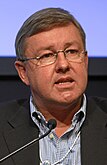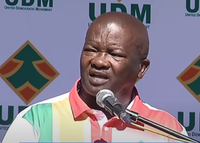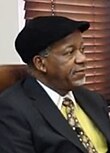The Republic of South Africa is a unitary parliamentary democratic republic. The President of South Africa serves both as head of state and as head of government. The President is elected by the National Assembly and must retain the confidence of the Assembly in order to remain in office. South Africans also elect provincial legislatures which govern each of the country's nine provinces.

The United Democratic Movement (UDM) is a centre-left, social-democratic, South African political party, formed by a prominent former National Party leader, Roelf Meyer, a former African National Congress and Transkei homeland leader, General Bantu Holomisa, and a former ANC Executive Committee member, John Taylor. It has an anti-separatist, pro-diversity platform; and supports an individualist South Africa with a strong moral sense, in both social and economic senses.

General elections were held in South Africa on Wednesday, 14 April 2004. The African National Congress (ANC) of President Thabo Mbeki, which came to power after the end of the apartheid system in 1994, was re-elected with an increased majority.

Angela Thokozile Didiza is a South African politician who is currently serving as Minister of Agriculture, Land Reform and Rural Development since May 2019. A member of the African National Congress (ANC), she was the Minister of Agriculture and Land Affairs from June 1999 to May 2006 and Minister of Public Works from May 2006 to September 2008.

Geraldine Joslyn Fraser-Moleketi is a South African politician who was the Minister of Public Service and Administration from June 1999 to September 2008. Before that, from July 1996 to June 1999, she was Minister of Welfare and Population Development. She represented the African National Congress (ANC) in the National Assembly from 1994 to 2008 and is a former deputy chairperson of the South African Communist Party (SACP).
South Africa since 1994 transitioned from the system of apartheid to one of majority rule. The election of 1994 resulted in a change in government with the African National Congress (ANC) coming to power. The ANC retained power after subsequent elections in 1999, 2004, 2009, 2014, and 2019. Children born during this period are known as the born-free generation, and those aged eighteen or older, were able to vote for the first time in 2014.

General elections were held in South Africa on 22 April 2009 to elect members of the National Assembly and provincial legislatures. These were the fourth general elections held since the end of the apartheid era.

The Congress of the People (COPE) is a South African political party formed in 2008 by former members of the African National Congress (ANC). The party was founded by former ANC members Mosiuoa Lekota, Mbhazima Shilowa and Mluleki George to contest the 2009 general election. The party was announced following a national convention held in Sandton on 1 November 2008, and was founded at a congress held in Bloemfontein on 16 December 2008. The name echoes the 1955 Congress of the People at which the Freedom Charter was adopted by the ANC and other parties, a name strongly contested by the ANC in a legal move dismissed by the Pretoria High Court.

Thandi Ruth Modise is a South African politician who is currently serving as the Minister of Defence and Military Veterans. She was previously the Premier of the North West from 2010 to 2014, Chairperson of the National Council of Provinces from 2014 to 2019, and Speaker of the National Assembly from 2019 to 2021.
The 50th National Conference of the African National Congress (ANC) took place from 16 to 20 December 1997 at the University of the North West in what was then called Mafikeng. Attended by 3,000 voting delegates, the conference elected a successor to outgoing ANC President Nelson Mandela, who declined to stand for another term. Thabo Mbeki was elected unopposed, and Jacob Zuma was elected unopposed as his deputy; they were later elected President and Deputy President of the country in the 1999 general elections, in which the ANC won 66.35% of the vote, up from 62.65% in 1994.
Godfrey Phumulo Masualle is a South African politician from the Eastern Cape who has represented the African National Congress (ANC) in the National Assembly since May 2019. He was Deputy Minister of Public Enterprises from May 2019 to March 2023, and before that he was the sixth Premier of the Eastern Cape from May 2014 to May 2019.
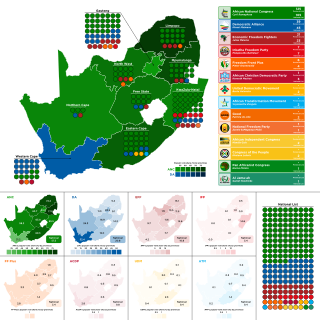
General elections were held in South Africa on 8 May 2019 to elect a new President, National Assembly and provincial legislatures in each province. These were the sixth elections held since the end of apartheid in 1994 and determined who would become the next President of South Africa.
The 49th National Conference of the African National Congress (ANC) was held from 17 to 22 December 1994 in Bloemfontein, the city in which the ANC was founded. The conference took place several months after the South Africa's first democratic elections, at which the ANC had won 62.65% of the national vote and incumbent ANC President Nelson Mandela had been elected national President. It was therefore the ANC's first national conference as a ruling party, and only its second national conference since its unbanning in 1990. The theme of the conference was "From Resistance to Reconstruction and Nation-Building." Attended by 2,719 voting delegates, it was held at the University of the Free State, which Mandela said was remarkable, given that the university had "condemned [the ANC] as subversive, as treasonable" during apartheid.

The 27th South African Parliament is the sixth Parliament of South Africa to convene since the introduction of non-racial government in South Africa in 1994. It was elected in the general election of 8 May 2019 and consists of the National Assembly and the National Council of Provinces. The National Assembly contains 400 members, while the National Council of Provinces contains 90 members. It was formally opened by President Ramaphosa's State of the Nation Address in a joint sitting on 20 June 2019.

General elections will be held in South Africa on 29 May 2024 to elect a new National Assembly as well as the provincial legislature in each of the nine provinces. This will be the seventh general election held under the conditions of universal adult suffrage since the end of the apartheid era in 1994. The new National Council of Provinces (NCOP) will be elected at the first sitting of each provincial legislature. Since the inaugural post-apartheid election in 1994, the African National Congress (ANC) has continuously achieved a majority in both chambers of the South African Parliament: the National Assembly and the National Council of Provinces.
Lionel Percival Hercules Mbeki Mtshali was a South African politician who was Premier of KwaZulu-Natal from 1999 to 2004. He was known for unilaterally ordering the expansion of the province's antiretrovirals programme during the HIV/AIDS epidemic, in defiance of the policy of the national government under President Thabo Mbeki. A founding member and former chairperson of the Inkatha Freedom Party, Mtshali was also national Minister of Arts, Culture, Science and Technology in the government of President Nelson Mandela from 1996 to 1999.
Azwindini Jeremiah "Jerry" Ndou is a South African politician and diplomat who has served as a Delegate to the National Council of Provinces (NCOP) since October 2022. Before that, he represented the African National Congress (ANC) in the Limpopo Provincial Legislature and Limpopo Executive Council.
Litho Suka is a South African politician and former educator who served as a councillor of Nelson Mandela Bay from 2015 until 2021. He was chief whip of council between 2015 and 2016. Prior to serving in council, Suka was a Permanent Delegate to the National Council of Provinces from 2014 to 2015 and before that, a member of the National Assembly of South Africa from 2009 to 2014. Suka had served as a member of the Eastern Cape Provincial Legislature from 1994 until 2009. He is a member of the African National Congress.
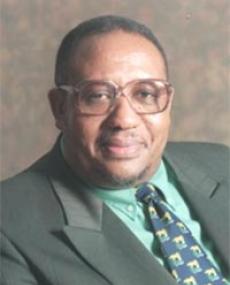
Moleeane Ben Skosana was a South African politician who served as Minister of Correctional Services from 1998 to 2004. He was a founding member of Inkatha Freedom Party (IFP) and represented the party in the National Assembly from 1994 until his death in 2014. He also served as House Chairperson of the National Assembly from 2009.
Annelizé van Wyk is a South African politician who served in the National Assembly from 1999 to 2014, excepting a brief hiatus in 2009. She represented the United Democratic Movement (UDM) until April 2003, when she crossed the floor to the African National Congress (ANC). She chaired the Portfolio Committee on Police from 2012 to 2014.





